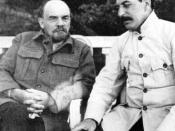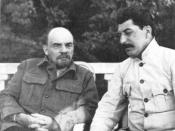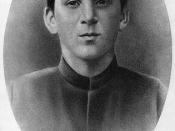Joseph Stalin's rise to power after Lenin's death in 1924 was one of difficulty considering his background, the former leader's distaste for him and his formidable opponent Trotsky. The challenges had inbuilt elements that were unchangeable, but Stalin, being a great organizer and manipulator, turned each one to his advantage.
Firstly, Stalin's family background, physical appearance, and work experience were not appealing factors that had paved his way to power. In a country racially aware as Russia (as demonstrated by their anti-Semitism), being born a Georgian with a father who was "an alcoholic village shoe cobbler" , a last name like Dzhugashvili and a provincial theological education which he did not even graduate from, Stalin's credentials did not liken that of a 'man of steel'. Nearly all of the other top ranking members of the politburo and the party were intellectuals, but Stalin was a peasant, limited to a pro-domestic view of the revolution.
His background did not provide him with the culture that Lenin had or the experience with foreign diplomacy that Trotsky possessed. His physical handicap of one arm being two inches shorter than the other, his short stature, and his small-pox marked face were certainly not attributes to be proud of. Furthermore, Stalin's initial years of work with the Mensheviks in Tiflis between 1899 and 1912 , his questionably brief arrests, ambiguous income, and speculated involvement with the police as a spy were not facts that pointed to a to-be revolutionary for the Bolshevik party. However, he had the foresight to change his allegiance to the Bolsheviks, attending a Bolshevik conference held in Finland as a delegate, changed his name, and befriended Lenin, who made his editor position at Pravda possible. All of the other aspects of his background, he utilized by being a reserved, quiet, seemingly...


